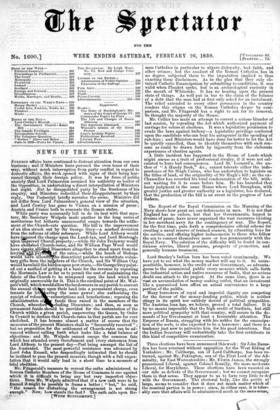NEWS OF THE WEEK.
FOREIGN affairs have continued to distract attention from our own business ; and if Ministers have pursued the even tenor of their way, without much interruption from party conflict in regard to domestic affairs, the week opened with signs of their being har- rassed through their foreign policy. It was by force of public anxiety that Lord Palmerston assumed his authority as leader of the Opposition, in undertaking a direct interpellation of Ministers last night. But he disappointed party by the frankness of his enquiry, and Ministers redoubled their disappointment by-their reply. Our Postscript briefly narrates the scene. Ministers did not differ from Lord Palmerston's general view of the situation, and Lord Cowley has gone to Vienna on a mission of peace ; Austria and France both to evacuate the Roman states.
While party was necessarily left to do its best with that mys- tery, Mr. Secretary Walpole made another in the long series of meritorious but hitherto unsuccessful essays towards the settle- ment of the Church-rate question. His bill is the improvement of an idea struck out by Sir George Grey—a marked deviation from the reforms of other reformers. While Lord Althorp would have isposect the charge upon the Land-tax, and Lord Monteagle upon improved Church property,—while Sir John Trelawny would have abolished Church-rates, and Sir William Page Wood would
have steeply, alr6 Dissenters altogether to stand apart from the levyinFaala'of the rates,7-while the bench of Bishops would have al ow' he dissentient parishes to substitute volun- tary gifts from the members of the Church, and Sir William Clay would heselaid the burden upon pew-rents,—Sir George Grey point- ed out a method of getting at a -basis for the revenue by repealing the lifortmain Law so far as to permit the cost of maintaining the fabric of the Church ti be reimposed upon the land which was originally answerable for it. This is the cardinal point of Mr. Wal- pme's bill, ;which would allowthelandowners in any parish to convert the annual eh e upon their land into a permanent charge, even tenants for lif aving the same power ; also authorizing the receipt of volunt -subscriptions and benefactions ; reposing the
administration of funds thus raised in the members of the Church wherefor eluding Dissenters ; and then, so soon as
permanent funds should be provided for the sustentation of the Church within a given parish, empowering the Queen, by Order in Council to declare that Church-rates in that parish are for ever abolished. It has become almost a matter of course that the measures of the present Ministers shall be "favourably received " ; but no proposition for the settlement of Church-rates can be ad- vanced without calling forth what looks like a fatal balance of objections : and Mr. Walpole cannot escape the common fate which has attended every Govefnment and every statesman from Lord Althorp to the present day—Peel being amongst the list of the frustrated. The most powerful resistance was advanced by Lord John Russell, who despondingly intimated that he should be inclined to pass the present measure, though with a full expec- tation that it would only lead in a short time to a measure of total abolition.
Mr. Fitzgerald's measure to correct the oaths administered to Roman Catholic Members of the House of Commons is one against which it is difficult to bring any but very imperfect objec- tions. Even Mr. Walpole admitted that if a new oath were to be framed it might be possible to frame a better ; "hut," he said, " the reason for disturbing the arrangement is not strong enough." Now, how stands the fact ? The oath calls upon Ro-
man Catholics in particular to abjure disloyalty, bad faith, and other crimes ; but the conduct of the Re-man Catholics has in no degree subjected- them to the imputation implied in thus exacting these disclaimers. As to the plea that they only ob- tained Catholic Emancipation by submitting to conditions, it was valid when Plunket spoke, but is an arehceological curiosity in the mouth of Whiteside. It has no bearing upon the present state of things. As well put in bar to the claim of the balance of a debt that the man had at first only asked for an instalment. The relief extended to every other persuasion in the country renders this stigma on the Roman Catholics deeper by com- parison, and Mr. Fitzgerald has a right to ask for its removal. So thought the majority of the House.
Mr. Collier has made an attempt to correct a serious blunder of last session, by repealing the Act which authorized payment of carriage for voters at elections. It was a legislative permission to evade the laws against bribery—a legislative privilege conferred upon the candidate who can beat his antagonist in the spending of cab-hire; and Ministers would have done far better to let the Act be quietly cancelled, than to identify themselves with such rea- sons as could be drawn forth by ingenuity from the elaborate experiences of election agents. A little incident has happened in the House of Lords which might amuse as a trait of professional rivalry. if it were not cal- culated to have bad consequences. Lord St. Leonard's, the au- thor of "A Handy Book," &e., cannot tolerate either the inde- pendence of Sir Hugh Cairns, who has undertaken to legislate on the titles of land, or the originality of Sir Hugh's bill ; so the ex- Chancellor has recorded his total condemnation of the bill, with- out waiting for it to come before him. He has hazarded that hasty judgment in the same House where Lord Brougham, with greater justice and greater authority as a legislator, has declared, that the production of the bill is an event in the progress of Law Reform.


































